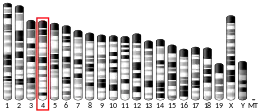WDR8
WD repeat-containing protein 8 is a protein that in humans is encoded by the WDR8 gene.[5]
| WRAP73 | |||||||||||||||||||||||||||||||||||||||||||||||||||
|---|---|---|---|---|---|---|---|---|---|---|---|---|---|---|---|---|---|---|---|---|---|---|---|---|---|---|---|---|---|---|---|---|---|---|---|---|---|---|---|---|---|---|---|---|---|---|---|---|---|---|---|
| Identifiers | |||||||||||||||||||||||||||||||||||||||||||||||||||
| Aliases | WRAP73, WDR8, WD repeat containing, antisense to TP73 | ||||||||||||||||||||||||||||||||||||||||||||||||||
| External IDs | OMIM: 606040 MGI: 1891749 HomoloGene: 9857 GeneCards: WRAP73 | ||||||||||||||||||||||||||||||||||||||||||||||||||
| |||||||||||||||||||||||||||||||||||||||||||||||||||
| |||||||||||||||||||||||||||||||||||||||||||||||||||
| |||||||||||||||||||||||||||||||||||||||||||||||||||
| |||||||||||||||||||||||||||||||||||||||||||||||||||
| |||||||||||||||||||||||||||||||||||||||||||||||||||
| Wikidata | |||||||||||||||||||||||||||||||||||||||||||||||||||
| |||||||||||||||||||||||||||||||||||||||||||||||||||
Function
This gene encodes a member of the WD repeat protein family. WD repeats are minimally conserved regions of approximately 40 amino acids typically bracketed by gly-his and trp-asp (GH-WD), which may facilitate formation of heterotrimeric or multiprotein complexes. Members of this family are involved in a variety of cellular processes, including cell cycle progression, signal transduction, apoptosis, and gene regulation. This family member is 89% identical to the mouse Wdr8 protein at the amino acid level. The function of this protein is not known, and the mouse studies suggest that the Wdr8 protein may play a role in the process of ossification (osteogenesis).[5]
References
- GRCh38: Ensembl release 89: ENSG00000116213 - Ensembl, May 2017
- GRCm38: Ensembl release 89: ENSMUSG00000029029 - Ensembl, May 2017
- "Human PubMed Reference:". National Center for Biotechnology Information, U.S. National Library of Medicine.
- "Mouse PubMed Reference:". National Center for Biotechnology Information, U.S. National Library of Medicine.
- "Entrez Gene: WDR8 WD repeat domain 8".
Further reading
- Koshizuka Y, Ikegawa S, Sano M, Nakamura K, Nakamura Y (March 2001). "Isolation, characterization, and mapping of the mouse and human WDR8 genes, members of a novel WD-repeat gene family". Genomics. 72 (3): 252–9. doi:10.1006/geno.2000.6475. PMID 11401440.
- Suzuki Y, Yoshitomo-Nakagawa K, Maruyama K, Suyama A, Sugano S (October 1997). "Construction and characterization of a full length-enriched and a 5'-end-enriched cDNA library". Gene. 200 (1–2): 149–56. doi:10.1016/S0378-1119(97)00411-3. PMID 9373149.
- Maruyama K, Sugano S (January 1994). "Oligo-capping: a simple method to replace the cap structure of eukaryotic mRNAs with oligoribonucleotides". Gene. 138 (1–2): 171–4. doi:10.1016/0378-1119(94)90802-8. PMID 8125298.




